|
The arrival of New Year’s Day often brings with it resolutions, goals, and new words or phrases that help us try to shape the next 365 days before us. Things like healthy eating, stricter budgets, more time spent in prayer, and increased amounts of exercise define our drives for self-improvement. We give extra time to turn our focus inward to make ourselves stronger, smarter, holier, and healthier. In an attempt to change our lifestyles, we might separate ourselves from our previous habits, relationships, or preferences so that we can sharpen our focus even more on self-growth. We hone our discipline and increase our self-reliance in the name of improvement. In the new year, our focus is often inward. While this inward focus isn’t harmful in itself, we might find ourselves stuck in our self-reliance. Now that a few weeks into the new year have passed, many of those resolutions, goals, and mantras might have faded into the background of post-holiday life. At this point, many of us have lapsed in our new practices, or we might have abandoned our resolutions altogether. We might find ourselves isolated in the new patterns we have picked up or starting to flounder due to a lack of support. Even though our New Year’s resolutions may have been made with the best or holiest of intentions, we might find ourselves failing without others to encourage us, support us, or hold us accountable. While the new year is the time when our focus is inward, the weeks soon after, when our discipline begins to wane, give us cause to lean outward. What would it look like to lean outward in our resolutions in the weeks ahead by seeking others to help us carry them out? Why might allowing ourselves to be helped by others and accompanied by them lead us to a more meaningful and spiritually significant pursuit of our resolutions? Though as Catholics we frequently hear about accompaniment in a context of explicitly spiritual progression, its fruitfulness is still applicable in non-explicitly spiritual goals in an informal sense. As the final document from the Synod on Young People, the Faith, and Vocational Discernment reminds us, “accompaniment cannot limit itself to the path of spiritual growth and to the practices of the Christian life” (Final Synod Document, 94). Accompaniment can help us experience transformation in many areas of our lives in addition to our spiritual life, as it “fosters growth in holiness through everyday circumstances and interests” (The Art of Accompaniment, 15). Though on the surface it may look like simply reaching out for the help of a friend, seeking out accompaniment to help us carry out our New Year’s resolutions has a deep theological and spiritual significance. Accompaniment is a form of “bear[ing] one another’s burdens [in order to] fulfill the law of Christ” (Galatians 6:2). When we seek another’s help to bear our burdens, experiences, hopes, and challenges, we open ourselves up to be in communion with someone else; we profess that we were created by God out of love, to love, and to be loved by others. Accompaniment is a simple way by which we actively remember that “The LORD God said: It is not good for the man to be alone” (Genesis 2:18). When we seek the help of another, we affirm the beauty of being human: we’re not meant to live life completely on our own effort and initiative. Having a good listener, mentor, or friends helps us to turn our inward focus in our resolutions outward. We no longer remain alone in our efforts, strivings, or discipline. The support of another trusted person helps us remain steadfast in our resolution to be healthier, spend more responsibly, or love more generously. This support can take the form of a quick text from an accountability partner to check in on our progress, or a weekly meet-up with a mentor to discuss our challenges. Similarly, we can seek more formal relationships of accompaniment to help meet our goals. Beginning a relationship with a therapist might help us explore more deeply our relationship with others or just as seeking the help of a personal trainer might allow us to have the added accountability to eat more nutritiously or get physically fit. Relying on others in the pursuit of transforming ourselves reminds us of the beautiful gift of being human: as human beings, we can have a profound effect on one another in providing support, love, and encouragement in growing into the people God has destined us to be. Whether sought out in a formal or informal sense, accompaniment challenges us to let ourselves be loved by others in the simplicity and complexity of our everyday life. Allowing ourselves to be supported by others, even in something as simple as our New Year’s resolutions, reveals the deep significance of others to our vocation to holiness.
0 Comments
“We Christians are called upon to preserve and spread the joy of waiting: we await God Who loves us infinitely and at the same time we are awaited by Him.” – Pope Francis
Over many years, I have been honored to accompany others in their vocation discernment and growth in faith through spiritual direction. Often, as is the case now, it is with young adults – undergraduate and graduate students, seminarians, and those beginning their work careers. In almost every instance, they try to prepare themselves well for the Lenten season, but rarely think about preparing for the Advent season. For many, the end of an academic semester as well as the gatherings, travel, and shopping for Thanksgiving and Christmas tend to leave little time to focus on Advent preparation and living. May I invite you, as I do them, to enter well into the waiting of Advent? It is meant to be a quiet time of deeper reflection on the coming of the Messiah, not just the first coming (the Incarnation) that we celebrate at Christmas, but the second coming of Christ at the end of time. The candles of the Advent wreath will be lit one after the other and the time will go by quickly. May we not let it not slip by, but use it well as a time of prayer, reflection, discernment, and deepening our encounter with Christ, through ongoing conversion of heart! May the Charity of Christ urge us on! For more resources to accompany you during the Advent season, please click here. It is fitting that as I write this blog in anticipation for National Vocation Awareness Week, the liturgical calendar has us moving through Paul’s letter to the Romans. In this letter, we find Paul emphasizing that we are now entering into a ‘new exodus.’ Just as Israel was liberated from Egyptian slavery, we are now liberated from the slavery of sin. The sacraments of Baptism and the Eucharist are the means by which Catholic Christian believers are joined to the new Exodus. Baptism is prefigured by the Israelites’ passage through the Red Sea, and the Eucharist is prefigured by the manna and the water from the rock in the desert. As we know well, the story does not end at our baptism. Rather, it is there that the story begins. Israel, having escaped from Egyptian slavery, quickly discovered that serving the Lord was even more demanding on the will than serving Pharaoh. In order to reach the Promised Land, the people of Israel had to take a path through a wilderness of trials and temptations. This path required a valiant conquest of all the obstacles of sin that stood in their way. In fact, the difficulty of the journey had some yearning for the days when they were slaves in Egypt. As children of the ‘new exodus’, our vocation in life is to travel through the wilderness of human life. Our exodus differs from the old in some ways, though. Our proclamation of the freedom found in Christ occurs while we travel. Our baptismal vocation calls us to ongoing sanctification, but it also calls us to witness this great exodus from sin and the new freedom in and won by Jesus Christ. We often desire the commitment to this ‘new exodus’ after seeing the commitment of others. This is a point that Fr. Luigi Giussani makes in his book titled, Is it Possible to Live this Way?. Fr. Giussani stresses the necessity of faith by which one encounters Christ indirectly through the witness of another. This witness tugs at our hearts to the point where we have no choice but to respond. Witnesses are therefore crucial to our discovery of this vocation - a vocation to partake in the new exodus. In my own life, my first example of such witnesses began with my parents. They not only gave me life, but they witnessed the faith by making the home a domestic church. Their marriage provided a template for me in my own vocation. They helped me see that the expression of freedom from the tyranny of selfishness comes through a spousal love. This spousal love is not exclusively expressed through the sacrament of matrimony, but it is also expressed through the sacrament of holy orders. As a diocesan priest, my local church in Harrisburg, particularly St. Francis Xavier in Gettysburg, is in a sense my spouse. I could not have such an understanding were it not for the witness of my parents. In addition, every seminarian and newly ordained priest can think of at least one other priest who first witnessed the presence of Christ to them through their own ministerial priesthood. In my case, I watched and learned first from my childhood pastor in New Hampshire, Fr. Marc Montminy. He was, and continues to be, a witness of Jesus Christ and a faithful spouse of the Church. Other priests who have taken on a similar role in my life are Fr. Frank Donio, S.A.C. (the Director of the Catholic Apostolate Center), priests of the Diocese of Harrisburg, faculty priests at Mount St. Mary’s Seminary, and priests elsewhere. As a priest, I seek (despite shortcomings and failures) to always be attentive to this desire - a desire to reach the promised land of eternal life through this new exodus. This is only possible because I have encountered people who not only accompanied me in discovering this desire, but who also witnessed it. This is, in essence, what it means to be a ‘humana viator’ (a wayfaring pilgrim). This is what it means to be an apostle. This is what it means to imitate Jesus Christ, the apostle of the Father. This is what it means to fulfill our baptismal vocation. During this National Vocation Awareness Week, may we be more attentive to this desire. May we recommit ourselves to this new exodus, which we have already begun through our baptism. May we also maintain and express our gratitude for those who have (and continue to) accompany us as witnesses. For more resources on Accompaniment, please click here. For more resources on Vocational Discernment, please click here. This week is National Vocations Awareness Week. When I tell my vocation story, I usually describe my vocation as a response to the great love that God has shown me throughout my life. I talk about what a joy it has been to fall in love with Christ and to give my whole life to him in a specific way in religious life. And that is absolutely true and beautiful. But if I’m being honest, it’s only part of the story. I am a novice with the Daughters of St. Paul, a congregation of women religious dedicated to evangelization through the media. Shortly before I entered the convent, I was plagued with a series of doubts regarding my vocation. I had discerned that God was calling me to enter religious life, but suddenly the vocation seemed too big for me. One time in particular, I went to my spiritual director deeply concerned that I had misrepresented myself to the sisters. When I looked in the mirror, I saw a normal 21-year-old. I’d watched The Office more times than I’d care to admit, had a newly acquired taste for craft beer, and had only kicked my swearing habit a few months before. As I prepared to move to the convent and begin my formation, I was worried that the sisters might be shocked to find out that I was still pretty far from being holy. “What makes you think that you haven’t been honest with the sisters?” my spiritual director asked me. “Whenever I visit the convent, I find myself acting like a much better person than I actually am. They’re going to find out the truth once they start living with me,” I explained. “Well,” he began chuckling, “Your vocation is the very thing that is going to make you into the best person you can be. That means you’re not there yet. But look, it’s already making you holier!” It can be tempting to think that we need to get our life in order before we respond to God’s call. We want to be perfect before we think that God can work through us. But friends, that day will never come on this side of heaven. And besides, that just isn’t God’s modus operandi. When we look at who God decides to call, it is never the person whom we would choose. Peter denied Jesus three times. Mary Magdalene had seven demons cast out from her. Paul, whom my congregation is named after, literally persecuted Christians. God is not afraid of our weaknesses or our wounds. In fact, it is often the very things that we view as obstacles to his grace that make us into powerful witnesses to his grace! The truth is, I’m not worthy of being called to be a religious sister. But no one is really worthy of this calling. That’s the beauty of a religious vocation and of the Christian life as a whole: it’s not about us and what we can do for God. It’s about God and what he wants to do in us. Every sacrifice that I’ve made in these past three years, every mistake, every time I have had to ask forgiveness or forgiven someone has served to make me into the person God wants me to be. So has every hour of Adoration, every Spirit-filled conversation, and every birthday that we’ve celebrated in community. There are these kinds of moments in every vocation where God uses something that seems strangely normal to bring us ever closer to himself. Vocation is a totally free gift that God has given to us. We could never earn or deserve it. It requires a response, but it begins with the fact that he has first loved us and desires to give us abundant life. That’s the truth about religious vocation— praise God for that. There’s something wonderfully intimate about entering an empty chapel or secluded church and embracing it for personal prayers. Our Lord continuously invites each of us to set aside our daily activities and distractions to spend some time gazing, discerning, and listening to Him who knows each of us better than we could ever understand ourselves. The ancient promise of Christ to “Come to me, all you that are weary and are carrying heavy burdens, and I will give you rest” assures us of the great love freely offered to us when we recall we are always in God’s holy presence. In doing so, the troubles and challenges we face in the world are trivialized and surrendered to God’s holy will so that our focus can be firmly fixed upon worshipping and honoring the One who calls us to Himself.
Whether it was in a parish church during the day, the school chapel in between classes, or even the private chapel of a religious community, my experiences of being able to utilize the simple intimacy and quiet of the moment offered me peace and sanctuary from the world. Of course, the Almighty is not restricted to the tabernacle of a church; His presence is infinite and forever available to us. There is, however, something affirming about entering into a space conducive to prayer and spirituality. The design and furnishing of a sacred space can draw our senses into an experience to better appreciate God’s presence in our lives. The light from outside may reflect colored light from stained glass windows upon the wall, the smell of candles or incense being burned convey that space is specially oriented to a higher purpose than what you just stepped out of, and the silence and lack of technology, advertising, or electronic distractions enable you to be more aware of your surroundings as you seek to hear God speaking to you. Encounters with the living God are not typically a Burning Bush or Annunciation experience; recall that the prophet Elijah sought to encounter God on Mount Horeb and found Him in the “sheer silence” rather than a strong wind, fire, or earthquake. We are all aware of the daily bombardment of digital content and of the professional, social, or academic obligations and expectations we face. They compete for our time and attention, can wear us down in routines, and force us to prioritize what is important for us to achieve. In our busy lives, we must actively choose to answer God’s constant and gentle call to “Abide in me as I abide in you.” He pours out His love for us freely, even when we are not always actively seeking Him or discerning His will for us. The Christian journey, then, is one of encounter and service; the love God extends to us is to be shared and offered to our neighbors, the marginalized, and even—especially—enemies. No matter our vocation in this life, our ultimate goal must be Heaven in the next. The saints are excellent role models in embracing the love of Christ and committing their lives to bringing that love to others. And while there is something beautiful about being the only person before the Lord in prayer and adoration, there is an even greater joy in bringing others to share in the experience and to worship God together. We do not walk the Christian way alone. As a wise friend of mine observed: "[W]e have to remember that the journey to heaven is not a solo trek. You seek to bring everyone with you. If one person falls, you travel to him or her, and help them get up, and you carry along together towards the destination. This is what God has entrusted us to do, to reveal such love as His love. Within our families, jobs, school, or wherever God calls us to be, we must give everything of ourselves in bringing others on the adventure, and helping them endure. Think of the image of exhaustively falling down on God’s doorstep after the journey is over. You look back, and see no one, because the ones traveling with you have gone inside already.[1]" [1] Joseph Cuda (lecture, Knights of Columbus Council #9542 business meeting, Washington, DC, November 3, 2013). http://knights.cua.edu/res/docs/Knights-Lecture-5-November-3-2013.pdf “Think big, start small.” That was the one-phrase summary that my working group at the Post-Synodal Forum on Young People presented on our last full day at the Il Carmelo retreat house. For three and a half days, over 250 youth and young adults from over 110 countries and over 30 Catholic groups and movements gathered in Rome to discuss the Synod on Young People, the Faith, and Vocational Discernment and Pope Francis’ Apostolic Exhortation Christus Vivit. My group was comprised of fourteen delegates who represented nations including India, Germany, Zambia, Slovenia, Moldova, and more. We came up with these four words (Think big, start small) because over the course of the many panels, presentations, interventions, and working group meetings, we realized just how big of an endeavor engaging the young people of our global Church is. Country to country, diocese to diocese, some general patterns remained the same. Christus Vivit and the synod present a beacon of hope; unfortunately, in many countries the document has not been widely read, although it has been generally well liked when it has been read. In many places, the document is not translated into the necessary languages. My friend Stephen from Hong Kong, for example, mentioned that young people simply cannot afford a printed copy of the document in his country. Many young people mentioned how they face opposition from clergy and lay people regarding their active role in the Church. One of the delegates from Ireland recalled an instance when a new dishwasher was touted as more important for her parish than funds to go to youth ministry when they were needed. The challenges that face us are great and they are global, but young people, and the members of the clergy and laity that support them and collaborate with them, will not be stopped. In chapter four of Christus Vivit, Pope Francis reminds young people that they are loved by God, that Christ saves us, and that Christ is alive! These words have settled deep into the hearts of young people and the people who advocate for and accompany them. Many times, Pope Francis has reminded young people that they are protagonists in the Church, that young people are not just the future of the Church, but also the now of the Church. These realities came up over and over again in our discussions at the forum. I was amazed by the initiatives in Ghana for ministry to young people that included a separate and distinct ministry to young people who are imprisoned. I was happily surprised to hear that many nations had national youth organizations that are led by young people. For example, my friend from India, Jesvita, is the most recent president of an Indian Catholic Student movement. Importantly, these initiatives are not ones that exist within a “young people bubble,” but are movements and ministries of collaboration that see the young people, the clergy, and their ‘elders’—as Pope Francis calls them in Christus Vivit—working together, being synodal. The biggest takeaways from this forum are encouraging to say the least. Young people understand the need to be people of action, or apostles on mission. Only then can we truly be leaders. These actions must be concrete, not vague generalizations, and they must be collaborative. Young people want to integrate what the Holy Father has written for us in Christus Vivit into how we approach our ministry to young people. The principle of accompaniment was one that was constantly highlighted at the forum, proof that young people want to be a generation of encounter. The first line of our ten-line summary that was presented to the Dicastery and the Holy Father read, “we are the face of Christ, fully alive.” And this is how we move forward, with an understanding of the reality that we are the face of Christ in our world, that we are protagonists. Acting with Christ as our guide, we seek the conversion of hearts, both ours and those of others, and we have dreams that are big. May we never be deterred, may we always think big and start small, and may we always seek to build the Kingdom of God by walking together, listening to one another, and persevering in our shared faith. For more resources on the Synod on Young People, Faith, and Vocational Discernment, please click here. As a PhD student, there are often many moments where I find myself buried under work, exhausted from studying, and wondering if subjecting myself to a five year program of studying, teaching, and writing is worth it. Although I love what I study and find it extremely life-giving, there are plenty of moments when I’ve felt hopeless, isolated, and anxious about a future career in academia. This past year, I found myself struggling in the midst of my third semester in my program. I felt emotionally and mentally exhausted by the demands of being a second-year student and teaching assistant. Frustrated, worried, and tired, I made an appointment with one of my professors, hoping that venting to someone who understands the challenges of academia might at least help somewhat. As I vented about my anxieties of being an effective teaching assistant, distinguished student, and successful future academic, my professor patiently listened. Even as my concrete worries about grading and lecturing for the first time began to turn into catastrophizing about never being hired at a college or university, my professor sat with me until I finished talking. She never minimized my feelings or invalidated my emotions. Instead, she shared with me her own challenges that she faced as a graduate student. Through stories about her own experiences, she admitted that she had been where I was, too. My professor didn’t let the conversation remain at a place of despair; she instead encouraged me to look at the bigger picture in all of these difficulties: God’s plan for each of us. She challenged me to think about my own vocation to be a graduate student and reminded me that it was God’s will that I was here. My professor helped me to see that despite my anxiety and worry, I was not alone. Not only did I have her support and the support of others at my university, but my present and future rested in the hands of my Creator. She also helped me notice places in my life where I was successful, and suggested places where I could become stronger. After talking about my strengths and areas of improvement, she offered advice, pointed me to other people that might also help, and offered to continue the conversation whenever I needed it. I left encouraged, feeling supported, and with a new perspective on my life as a graduate student. When I first scheduled my meeting with my professor, I had only expected to give voice to my worries to someone who knew what I was talking about; however, when I left my meeting, I felt that I was no longer walking alone on my path. My professor was walking with me, accompanying me on my journey as a graduate student. Upon later reflection, this moment of accompaniment shared with my professor reminded me of Jesus’ own style of accompaniment on the Road to Emmaus (Luke 24:13-35). Like the disciples who were dejected, disillusioned, and confused about the events that had taken place in Jerusalem surrounding Jesus’ death, I too was anxious about my own life as a graduate student. My professor offered a presence of patient listening, even when my worries began spiraling into despair. Instead of invalidating my response to the challenges of my life, my professor, like Jesus, “drew near” (Luke 24:15) to me by sharing with me her own difficulties as a graduate student. My professor also helped me to shift my perspective. She imitated Jesus on the Road to Emmaus by reminding me of God’s role and plan in my life, encouraging me to look beyond the challenges of the present moment. Finally, my professor helped me to remember my own sense of mission and vocation, and move actively towards them. As Jesus interpreted the scriptures with the travelers on the way (Luke: 24:27), my professor assisted me in reading God’s revelation in my own life through my strengths and weaknesses, encouraging me to develop and strengthen my gifts in order to respond to God’s call. As Jesus walked with the disciples towards a definitive direction, my professor was walking with me towards a certain goal: greater trust in God and more freedom from anxiety in order to live out my vocation. After this moment of accompaniment with my professor, I continued on my path as a graduate student with a new sense of support and encouragement. Like the disciples after their own powerful encounter of accompaniment with Christ, I too returned to my own mission as a graduate student, but with renewed hope and enthusiasm. My experience of being accompanied by my professor made a significant impact on the way I think about my own life and vocation. In that simple meeting, my professor reminded me that no one lives out their vocation and personal mission in isolation. Instead, we need one another on this pilgrimage towards full realization of being the beloved of Christ. Accompaniment allows us to walk together towards Christ; it turns the challenges of the journey into opportunities to discover God’s love with and through one another. Who might accompany you on your journey towards Christ? How can you accompany others through challenges that you’ve faced? For more resources on mentorship and accompaniment, please click here.
The beginning of summer is an exciting time. The school year may be done, and more leisurely activities may be planned, but for the ministry of a local church, the work never stops. The sacraments must be administered, the Holy Mass must be celebrated, the sick and dying must be cared for, and those with life’s burdens and clouds of uncertainty must be consoled: the sacred works of ministry never cease. As even our Lord observed, “The harvest is abundant but the laborers are few; so ask the master of the harvest to send out laborers for his harvest.” God calls upon certain men to embrace a unique vocation of humble sanctity, service, and obedience as priests. As such, seeing the result of years—even decades—of discernment and spiritual formation come to fruition is a cause of immense jubilation for a local church. Ordination day, then, gathers the diocese to happily witness the sacred rite through which the bishop consecrates these men into priestly service. And how wonderful such an occasion is— especially for those who have walked with these men—as new spiritual life is breathed into the church.
While recent scandals might cause some to worry or be wary, the celebration of priestly ordination serves as a reminder that God remains with us and never ceases in caring for the needs of his Church. The sinful actions of a few do not negate the sanctity and solemnity of a call to holy priesthood; the standard remains high even though some have acted beneath it. The saying “God is good, all the time; all the time, God is good” serves as a simple but handy reminder of His faithfulness, which is manifested in the ongoing call for certain men to care for the immense needs of His people. As Cardinal Timothy Dolan of New York observed: Is that not good news? Aren’t you tired of hearing about priests who are trouble? Aren’t you fatigued about hearing of priests in scandals? Aren’t you kind of weary [hearing] about priests that have been removed? Don’t you get a little discouraged when you hear about the vocation crisis? Now, all of those are realities; we don’t need to run from them, but I don’t know about you, but I see six new priests who are enthusiastic and eager and raring to go. That gives me a lot of hope and a lot of encouragement. And it’s going to be a high honor for me to ordain them. Discerning how to answer God’s calling to a vocation in your life is an ongoing process, but this does not mean you need to wrestle with it alone. The Church has a wealth of resources to aid in beginning to answer the questions regarding vocational discernment. Spiritual direction is a common method—whether in person or through a treasure trove of books and reflections which have been produced through the centuries and for a Church which has faced a whole spectrum of challenges and threats. God remains with us through it all! Other means of discernment include retreats and talks offered by dioceses and religious communities. And this is also true for those who may be discerning marriage as a vocation. In Holy Scripture, priesthood can be traced back to the Levite tribe of the Israelites, but the family unit is often modeled after the Holy Family, the highest ideal. No matter what your calling in life, God has sanctified it and calls us all to best apply our lives to the service of others through our vocation. Just as the United States has recently commemorated Memorial Day and the countless who have died answering the call to fight for and defend our rights and freedoms, we as a church can come together to appreciate and love our priests, who live to serve the Body of Christ. They have heard and answered the call of the Most High God and trusted in Him to illuminate the path they have been destined to follow in service. They walk with us in faith to celebrate the sacramental life of the Church and comfort those who seek consolation and peace. In supporting our priests and religious—who can be found in parishes, hospitals, cemeteries, battlefields, and schools—we can celebrate with them as their numbers increase during ordinations so as to aid in the beautiful works of holy ministry. For more resources on Vocational Discernment, please click here. . Every year, on the Fourth Sunday of Easter, we hear a Gospel passage about Jesus, the Good Shepherd. On this day, the Church also invites us to prayer and reflection on vocations as part of the World Day of Prayer for Vocations. In his 2019 Message for this day, Pope Francis offers a significant consideration for all those involved in Church ministries:
“Dear friends, it is not always easy to discern our vocation and to steer our life in the right direction. For this reason, there needs to be a renewed commitment on the part of the whole Church – priests, religious, pastoral workers and educators – to provide young people in particular with opportunities for listening and discernment. There is a need for a youth ministry and a vocational promotion that can open the way to discovering God’s plan, above all through prayer, meditation on God’s word, eucharistic adoration and spiritual accompaniment.” The Synod on Young People, the Faith, and Vocational Discernment reflected on this theme which resulted in both the Final Document of the Synod and in the Post-Synodal Apostolic Exhortation, Christus Vivit, offering important insights that can help not only those in Church ministries, but all to accompany young people in their vocational discernment and then to live that vocation well once they have come to know where Christ is calling them. St. Vincent Pallotti, whose 201st anniversary of ordination to the priesthood is today, understood well how to accompany young people in their vocational discernment. He was a sought-after spiritual director and confessor who went to all, especially young people, where they were. He provided many opportunities for both youth and young adults – lay (single and married), religious, seminarians, and priests – to deepen their encounter with Christ, grow in holiness, and live their call from him as an apostle. Pallotti’s witness of holiness of life and example of faith, particularly though his works of charity, inspired all who knew him to live more fully for Christ. Today, his approach offers us an example of what Pope Francis describes in Christus Vivit, n. 242: “Young people need to have their freedom respected, yet they also need to be accompanied.” May the Charity of Christ urge us on! For more resources on Vocational Discernment, please click here. The Catholic Apostolate Center has had a presence at the Mid-Atlantic Congress (MAC) since 2013. Over these years, we have created spaces for attendees to gather and network; to share our resources and programs in the exhibit space; and to offer our expertise on various topics facing Catholic leaders today. This work is not done on our own: it is accomplished through great collaboration among the planners of the Congress, our presentation partners, and our team. I have had the opportunity to be the point person for the Center’s involvement with MAC since we first started attending. Over the years I have been able to work with our team and our collaborators to develop presentations that are interesting, relevant, and useful in the Church today. Each year, I am always struck by the work of the Holy Spirit in each of the aspects of our involvement with MAC, and this year was no exception. Our two presentations brought together members of our team with two outside collaborators from the Archdioceses of Los Angeles and Washington. Our first presentation, titled “What now? Vocational Discernment and Accompaniment After the 2018 Synod,” focused on the experiences of three young adults who were in Rome during last year’s Synod on Young People, the Faith, and Vocational Discernment. We had many conversations prior to the event about what each presenter would talk about and how they would present, but I was still struck while watching the presentation at how alive the Church is in her young people. Our second presentation, titled “Using Social Media and Digital Resources to be Catholic Evangelical Witnesses,” helped Catholic leaders learn more about how to use social media and other digital resources to evangelize within their parishes, dioceses, and organizations. At the Center, social media and digital resources are part of our everyday work, so it is easy for me to forget how useful these tools may be for a group or parish starting to reach out by those means. Our team gave insight into the various platforms, but also offered suggestions about how to use social media in a productive, charitable way. St. Vincent Pallotti, the patron saint of the Catholic Apostolate Center, encouraged collaboration among clergy, religious, and the laity when he was a priest in Rome in the early 19th century. His message of collaboration is still true today and a goal the Center strives for in all that we do. Events like the Mid-Atlantic Congress are a great way to live out St. Vincent Pallotti’s hope – we can grow who we are individually, spiritually, and organizationally when we work in collaboration with one another. The word vocation comes from the Latin “vocare,” which means to be called. Like any call, we are offered a choice to answer or ignore it. Assisting others in discerning their apostolic vocation in life was an important aspect of the ministry of the Catholic Apostolate Center’s patron, St. Vincent Pallotti. Pallotti had a great belief in apostleship and what the Church today refers to as the “universal call to holiness.” Many years before the Second Vatican Council formally addressed the role of the laity in the Church, Pallotti understood deeply that each member of the Body of Christ plays a significant role in evangelization. This included the active participation of the laity in collaboration with priests and religious. As the Union of the Catholic Apostolate stated in a 2012 reflection, “Saint Vincent Pallotti was the first to show that the laity on their part share different talents and vocations, possess hidden treasures, and should be employed in the work of evangelization, of edification and of sanctification.” All of this work comprises our vocation, and is what I’m referring to when I speak of our vocation with a little “v.” Before we can begin to think about whether God is calling us to religious life, marriage, or the celibate single life (known as our Vocations with a capital “v”), we must first look to live out the calling he gives all of us: holiness. I was raised outside of the Church. As a result, I wasn’t exposed to our beautiful faith (outside of my baptism) until high school. It wasn’t until three years into my high school career that I began to see religion, which had forever been just a class to me, as being something worth pursuing. Yet in high school, I more deeply came to understand Jesus’ words in Mark 2:17, “It is not those who are healthy who need a physician, but those who are sick; I did not come to call the righteous, but sinners." A life of apostleship, which will lead to the better discernment of our Vocation, is not one of perfection, but of accompaniment and relationship building. We accompany others as they live out their vocation. Similarly, we are accompanied, which helps us keep going when we fall. Our vocation is not something that we choose when to live out, but rather it is an essential and fundamental part of our lives as Christians. As baptized members of the faithful, we are called to live out our baptismal offices of priest, prophet, and king. To live out this call to holiness we must begin with prayer. Prayer, as St. Vincent Pallotti said, “consists in directing all one’s thoughts, words, and actions on God.” In fact, we should pray so much that we “pray without ceasing.” That means that we are living lives that are so full of God, so full of doing his will, that all of our actions, words, and thoughts become a prayer. It can be helpful to remember that prayer is a dialogue. Sometimes we talk and other times we are silent, waiting to hear the voice of God in whichever ways he decides to speak to us. Secondly, we live out our vocations of holiness by living a life of doing good and avoiding evil. This comes from practicing charity with our neighbors and with ourselves and from opening our hearts to those around us who Pope Francis would say are “at the margins.” Through the living out of our vocation, we help others to encounter Christ. This encounter is at the heart of our faith. As Pope Benedict XVI said, “Being Christian is not the result of an ethical choice or a lofty idea, but the encounter with an event, a person, which gives life a new horizon and a decisive direction.” Lastly, we must take part in the sacraments. God’s plan for our salvation is rooted in Christ, whose grace is poured out in all of the sacraments. We should receive the Eucharist, spend time in Adoration, and frequently receive his mercy in the Sacrament of Reconciliation. We have been given all of the tools necessary for living lives of holiness. Those tools are strengthened when we receive the sacraments. So how does living out holiness, our lowercase vocation, pertain to our Vocation? I would argue that living out our Vocation, the call to religious life, priesthood, marriage, or the celibate single life, is one of the highest achievements of living out our vocation. A marriage cannot thrive, for example, without love, hope, mercy, prayer, and kindness. Neither would the ministry of a priest or religious sister. When we truly see the beauty of the promises of Christ: salvation, freedom, mercy, and redemption, we naturally want to know how best to achieve and share them with others. When we understand our call to holiness, and live out our vocations, uppercase and lowercase “v,” then we will help to become saints and build the Kingdom of God. For more resources on Vocational Discernment, please click here. After being blessed with the opportunity to study abroad, I realized I had a lot of prep-work before actually stepping foot in Rome. Before I found myself settled and adjusted to life in Italy, there was much discussion amongst my family and friends about the possibility of leaving home for the semester to do something unknown and probably a little challenging. It involved taking inventory of packed luggage and making sure I had all my paperwork in order – over and over and over again. There were goodbyes to be said and nerves to quell – all for the bigger and extremely beautiful pursuit of this adventure abroad. Being a student in Rome, with a faith life that begs to be fed with inspiration and experience, I have found myself smiling ear-to-ear both in Saint Peter’s Square as Papa Francesco drove by in the Popemobile and also on my knees, alone in a little chapel that has really become my home-away-from-home. Something that is often on my mind and recently discussed in the Synod is vocational discernment. “Vocational Discernment” is one of those phrases that is often more of an unknown idea rather than a reality being lived. In simple terms, I consider vocational discernment to be an alert willingness to hear and accept God’s will. And now that we have a definition, the next question is: How does one even go about this? I believe the answer is very similar to my process of preparing to study abroad or maybe to that of applying to college or even to searching for a job. However, many – myself included – often find these tasks to be obstacles, not opportunities. I’ve come to learn that discernment can be just as exciting as your next adventure. I was recently able to attend a youth presentation to the pope in Paul VI Hall. After many dance routines, witness talks, and musical performances, Pope Francis delivered a short speech in which he expressed the following: “You won’t find yourself in a mirror or the screen of your phone, so get up and find beauty in nature, family, friends, and the faith.” One of the most important aspects of discernment is communication. Just as I spent many hours talking to my parents, sister, and best friends about the opportunity to go abroad, I spend quite a bit of time in prayer each day. I use prayer as a way to open my heart to God, sharing desires, fears, hopes, and struggles—just as you would recall your day to your parent or friend over dinner or Snapchat—to seek guidance and advice. And who better to seek answers of clarity from than those who know you best? A huge part of my discernment is actively listening – not only in prayer, but to all those around me. Listen to the girl who sits next to you in your English 101 class or the stranger leading your retreat who could be a potential friend and witness of the faith for you. Paraphrasing the words of Pope John Paul II at his pontifical inauguration: Open wide the doors of your heart—for God and all who are around you—and do not be afraid. Do this, and God will put the right people in your life and guide your heart in the direction it needs to go. It is through a deep prayer life that you are then able to take a thorough inventory of your spiritual and relational life, often being led to questions you haven’t really asked yourself before. Perhaps you may become aware of a quality you admire in someone else, prompting you to work on it in yourself. Or maybe all those doubts you carry and try to file away in the corner of your mind come front and center, but now with a new understanding of how to face them. After you begin to recognize the good in yourself and acknowledge the things that are holding you back, it is then time to start saying goodbyes. Saying goodbye not in a literal sense, but in attempting to break bad habits, dying to self in pursuit of a greater humility, and in effect allowing more room for God’s love and mercy to calm your fears and erase the sins that hold you back. The more you allow God to work in you, the clearer and easier it will be to feel your faith grow, relationships flourish, and your heart rest. Like anything, the hardest part of the discernment process is letting go of fear and “What Ifs”—but it is through prayer that God will provide the answers you need to move forward and the courage to live out your calling as authentically and faithfully as possible. As mentioned before, this may require leaving some comforts and pleasures behind, but Jesus assures us today, just as he did his disciples in their time, “Everyone who has given [anything] up… for the sake of my name will receive a hundred times more and will inherit eternal life” (Mark 10:29-30). Part of my vocational discernment led me to take this opportunity – full of unknowns and challenges – to study abroad in the “Eternal City.” I assure you, vocational discernment is necessary and opens so many doors, or in my case ATAC bus rides, to growth and understanding of God and His will for you. For more resources on the Synod on Young People, the Faith, and Vocational Discernment, please click here. One of the topics the 2018 Synod on Young People, the Faith, and Vocational Discernment sought to address was the role of mentorship in the development of the spiritual life. In a time when so many of us seek to know more about the faith and struggle to find faithful examples in the world, the topic of mentorship is extraordinarily important in nourishing young Christians in the faith. The Instrumentum Laboris for the Synod, published in March, brings up two major points that address the roles a mentor has today. The first, and most talked about, is that of accompaniment. The other is education, which is especially important in a time when we live in an increasingly secular culture. These two facets of mentorship are different and cannot always be fulfilled by one person. For this reason, the contribution of the community of faith is incredibly important. In my life, faith education came from many sources, but none was more important than my Confirmation teacher who was also my youth basketball coach and the father of one of my best friends. Throughout my life, my mentor helped me to learn and grow more in my faith by inviting me to events and men’s conferences. In my Confirmation classes, he showed the beauty of the Faith and helped me understand the truth that flows from the Church’s teachings. Like many young people, I didn’t fully take advantage of a great mentor when I had the chance. But his presence in my life continues today, and his example is a continual witness of what it means to be a faithful Christian. When we look at the life of a saint, we often see the impact other peers, mentors, or saints had in their life. St. Augustine, for example, had two great saintly mentors: St. Monica (his mother) and St. Ambrose. St. Monica, who prayed tirelessly for the conversion of her son, showed the young Augustine an example of the Christian faith in a lived way. Augustine only fully appreciated this until after his conversion. St. Ambrose provided Augustine—who was struggling with his dualist view of the universe—with the truths found in the Christian faith, which strengthened Augustine and propelled him to ultimately become a Doctor of the Church. In my life, my friends and peers have been incredible examples of accompaniment. An intimate and baseline knowledge about me makes it so much easier for a friend or peer to understand where I am in life and how to proceed. Peer mentorship, in my experience, is only possible because of the tireless effort that my parents, teachers, ministers etc. have put into nurturing me in understanding and action in the Faith. Without those people I wouldn’t have had the faithful and honest advice that is always so valuable to making me a better Catholic. Just as Jesus sent out his Apostles two by two, we share in the Apostles’ mission to evangelize the world and we must rely on those who share our mission for their support in life. Saints are often friends with other saints. Two men who followed in the footsteps of the Apostles in fraternity and holiness were St. Ignatius of Loyola and St. Francis Xavier. In the early days of the Jesuit Order, these saints relied on one another for the strength to persevere in promoting the mission of the Society of Jesus. Roommates at the University of Paris, their friendship was centered around Jesus and informed by their studies in Theology. The union of intimate friendship and a well-formed Christian mind creates incredible fruits, which are seen clearly in the success of the Jesuit Order in the missionary work in Europe and around the world. A revitalized sense of mentorship among Christians is so necessary in a time when the world directs us away from God and into itself. The responsibility for educating and accompanying young people falls on old and young alike. So many young people search for true meaning. It is our responsibility as Christians to take their hand and walk them closer to faith by showing them the truth in the Church’s teachings. The 2018 Synod is so important because it refocuses on the universal call to holiness. We are called to invite young people into the fullness of the Faith through mentorship, educating them in the fullness of her truth and accompanying them through their struggles—always striving to bring each other closer to Christ along the way. Questions for Reflection: Do you have any examples of mentorship in your own life? How can you accompany and educate those around you in the example of Christ? For more resources on the Synod on Young People, the Faith, and Vocational Discernment, please click here. Evangelization is a timeless vocation for all Christians. In our modern world, secularism surrounds us and sometimes it feels as though our Church can barely get in a word. Because of this, the current Synod on Young People, the Faith, and Vocational Discernment could not have come at a more needed time. Isaiah 6:8 says, “Then I heard the voice of the Lord saying, ‘Whom shall I send? Who will go for us?’” Isaiah responds, “Here I am…send me!” As the youth of the Catholic Church, we are the present and future of the Church. We are called to exclaim “Send me!” and to spread the Good News of our Lord and Savior, Jesus Christ, yesterday, today, and always! However, it would be foolish if we thought that every young person innately felt and understood this call. The secular world has had an impact on my faith, beginning in my own home. Not every member of my family is a practicing Catholic, which has given my mother and me the opportunity to evangelize in our own house. A prime example of this is praying before meals. I was taught to pray before meals in high school and I continue to do so in college. When I came home for the first time during my first year of college, I struggled to pray before meals because I feared someone noticing me or judging me. Eventually, God gave me the strength to begin to share this prayer with my family and now it is a tradition that we have established together. When he addressed young people at a meeting in the beginning of October (which I attended), Pope Francis said, “Make your way. Be young on the move, looking at the horizons, not the mirror. Always looking forward, on the way, and not sitting on the couch.” Our Holy Father reminds us in these words that our time is now to be consistent in our faith, live the Beatitudes, and serve one another in an effort to help each other grow. “How can I do this?” you might ask. As Pope Francis said, the Synod Fathers will—and have already begun—to answer you. In the synodal document Instrumentum Laboris under the section titled Beyond Secularization, the Synod Fathers speak about the changing view of religion in the secular world. Quoting a Bishops’ Conference, the document states, “Many young people declare that they are looking for the meaning of life, pursuing ideals, searching for their own personal spirituality and faith, but they rarely turn to the Church.” Recognizing that every young person’s path towards the Church is different, the Synod Fathers propose that we focus on the “changed attitude towards religion,” moving away from a “liquid” form of faith to a more concrete belief. Pope Francis uses the same metaphor in his response to the young people at the Synod rally I attended. He said, “Every road you make, to be reliable, must be concrete.” He continues, reminding us that “concreteness is the guarantee to move forward.” Every day, we have concrete encounters with our surrounding world. How can we as Catholics take our faith and make it concrete to those around us? This call from Pope Francis reminded me that my everyday experience of studying in Rome (only a short walk from the Vatican) can be used in my own acts of daily evangelization, especially when I return to the United States. Sharing a concrete experience is “making a gift of oneself and participating in the proclamation of the Good News,” as the Preparatory Document for the Synod states. We, as young people, are the present and future of the Church. She needs us to go out and make a difference. The salvation offered by Christ enables us to rejoice in this world, and the best way to do that is to spread His glory. Be concrete in your faith and you shall “renew the face of the earth.” For more resources on the ongoing Synod, please click here. To learn what it means to be a missionary disciple, please click here. From October 3rd until the 28th, 2018 bishops from around the globe are gathering in Vatican City for the 15th Ordinary General Assembly of the Synod of Bishops. The Synod is an assembly of the world’s bishops who assist the pope by offering insights on important questions the Church is facing in a manner that preserves and promotes her teachings. A General Assembly of the Synod of Bishops is called “Ordinary” if its topic is “for the good of the universal Church” and seems to require the “learning, prudence and counsel” of all the world's bishops. For October’s historic meeting, Pope Francis dedicated the theme to “Young People, the Faith, and Vocational Discernment.” Although the young adults invited to participate were not voting members of the Synod, they had the opportunity to address the Order of Bishops as presenters and auditors. It can be useful to consider the gathering as a conversation that included involvement from bishops and small group sessions. These activities were a beautiful continuation of the dialogue and collaboration characteristic of the Second Vatican Council: of a Church embracing renewal throughout the Body of Christ.
Yet the vast majority of the Church was not in the Vatican participating in small groups, sharing experiences, or making presentations. While the meeting has been significant in its own right, it may not be on the forefront of most people’s minds a city—let alone an ocean—away. As we wait for the working documents of the meeting to be finalized and published, we may be asking how we can best support the work of the Synod from afar. As a young person myself, I think it is incredible that this demographic is being discussed and studied at length by the Church. The Synod inspires a unique opportunity to ponder young people’s place in the Church and world. The typical young person is preoccupied with studies or work, family and social obligations, and sorting out his or her place in an ever-changing world. Thanks to technology, the world is better connected in some senses, though what occurs daily in our physical sphere tends to represent the extent to which a young person may physically engage with the outside world. Why think about faraway gatherings when there is plenty to deal with right in front of you? You may also wonder, Why would anyone care about little ole me and what I do? But that’s exactly what—and who—the Holy Father is interested in hearing about. Over a year before the Synod was scheduled to meet, Pope Francis released his Letter to Young People and invited youth to “Make your voice heard, let it resonate in communities and let it be heard by your shepherds of souls.” To help facilitate gathering the input of young people, the Vatican Synod Office launched a special website and survey which invited responses that were incorporated into a working document. Furthermore, Pope Francis issued his latest Apostolic Exhortation, Gaudete et Exsultate, on the call to holiness in today’s world, which directly relates to the vocational aspects of the Synod. Seeking for something more concrete? Look no further than your own parish! The walls of a church are not designed to keep persons out, but to gather them in to live more actively in Christ and the Church Universal! Never doubt the awesome power of prayer: interceding for not only the participants of the Synod, but those around you whose needs you may know personally. Go a step further and offer your gifts, talents, time, and presence as a young person and give witness to charity. Show the world that young people are not self-absorbed but active and invested in promoting the good of humanity. Find others who want to make a difference. Invite them to pray with you, to volunteer in service, to catechize, and even just to share in the joys and fun of youth. Demonstrate that youth is not just a period of transition, but an opportunity to channel passion and energy in a meaningful and responsible way for the Church and world. A lesson from the 2018 Synod is that the Church wants to better minister to young people! Recognizing young people as a treasure not merely for the future, but for the Church here and now signifies their potential and important state in life. Instilling the values of the Faith in young people inspires them to more actively discern God’s call for them in holy vocations. The world is not perfect—neither is the Church—but recognizing the good that can be brought about and the ability to pick oneself up after falling short is a great gift God has uniquely given young people to witness! By growing in our vocation to holiness, we fulfill the mission and dream of this year’s Synod. What a joy it is to see young people take to heart the holiness that God has called them to. To learn more about the recent Synod on Young People, the Faith, and Vocational Discernment, please click here. |
Details
Archives
July 2024
Categories
All
|
About |
Media |
© COPYRIGHT 2024 | ALL RIGHTS RESERVED


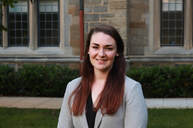
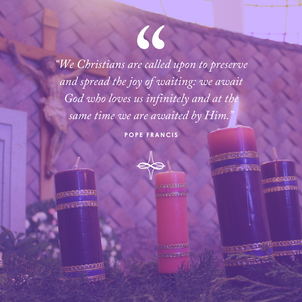
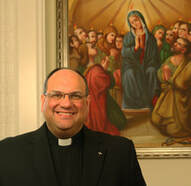
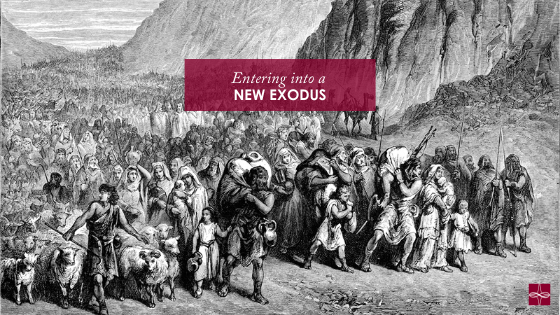
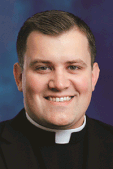
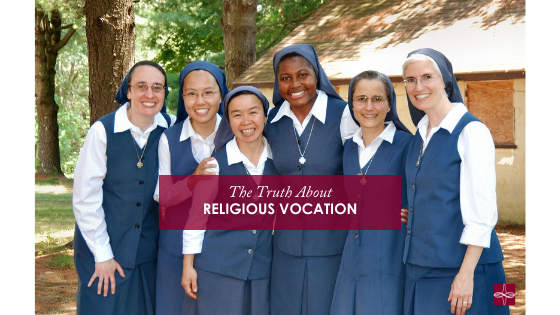
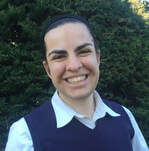


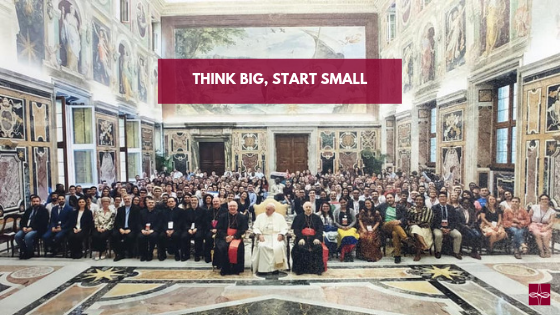
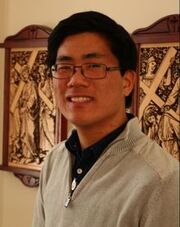
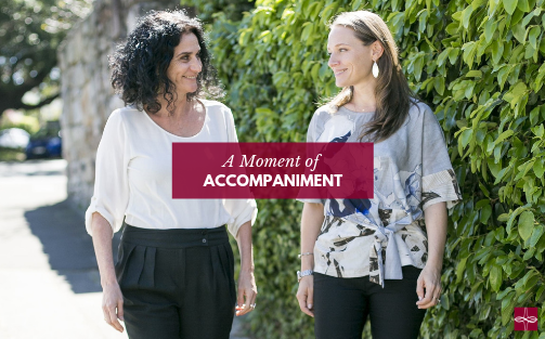
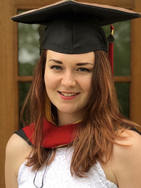
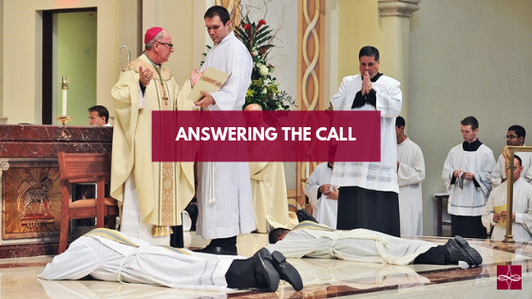

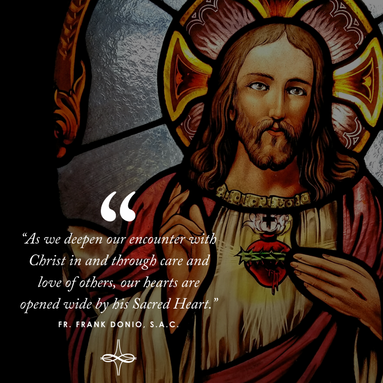
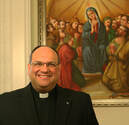
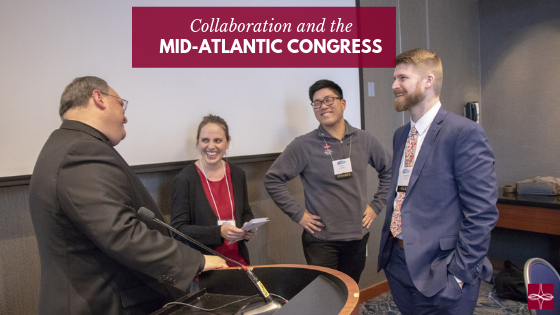
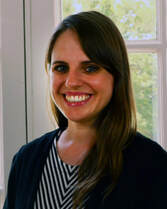
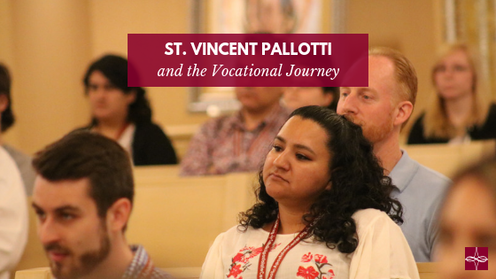
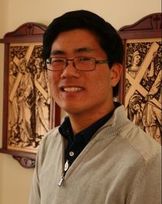
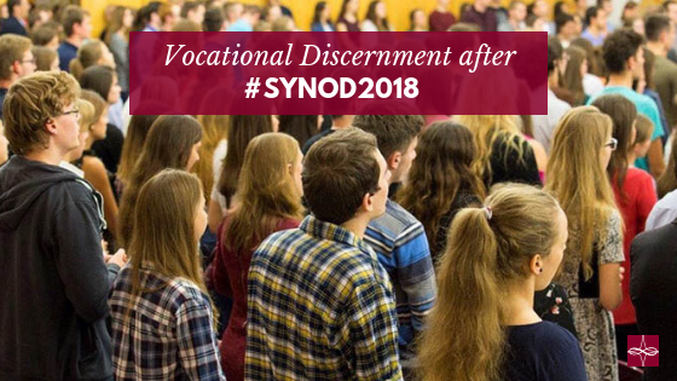
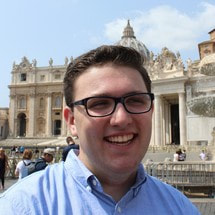
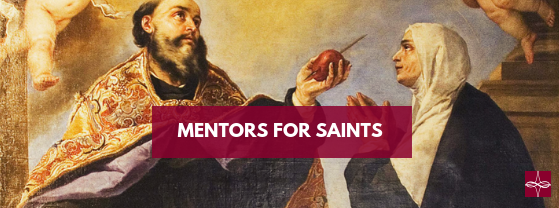
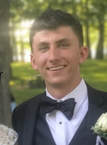
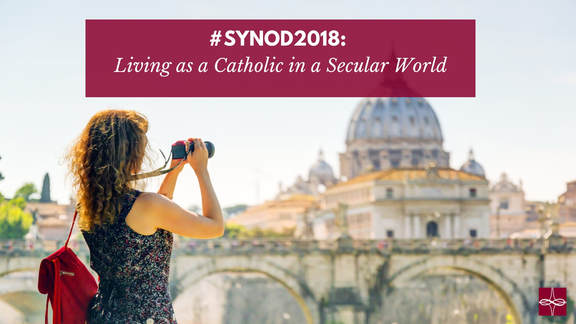
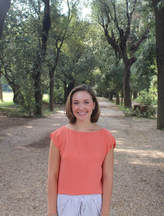
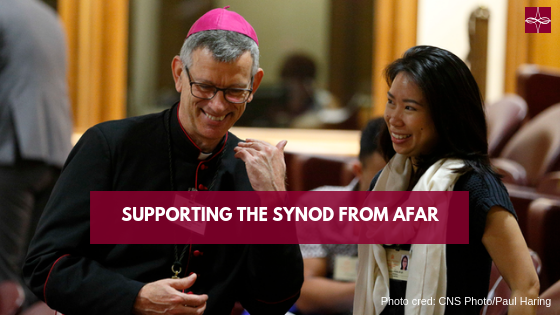

 RSS Feed
RSS Feed